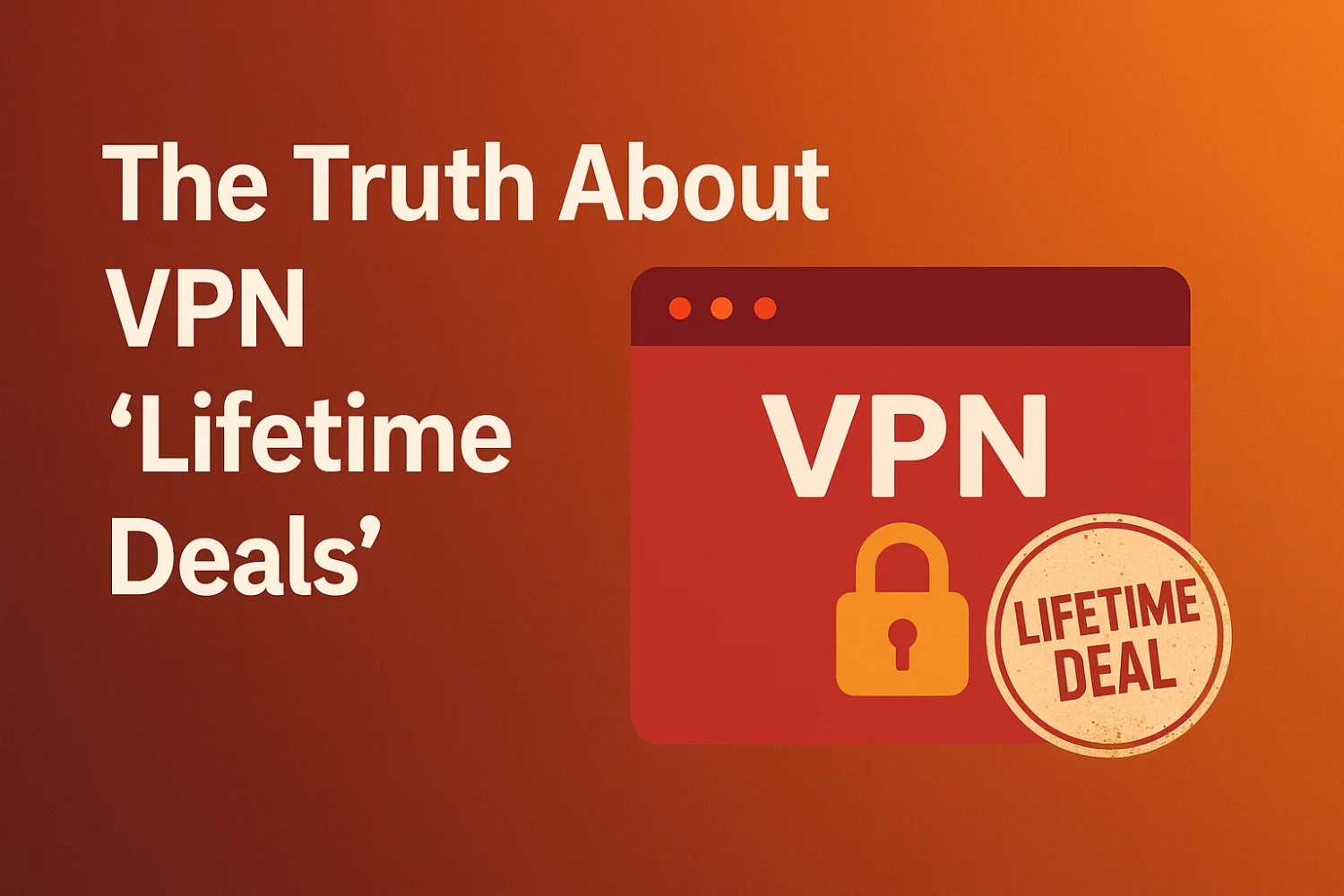Ever seen an irresistible ad promising “Lifetime VPN for just $49!” and wondered how that could possibly make sense financially for the VPN provider? You’re not alone—and the uncomfortable truth is, in many cases, it doesn’t.
Here’s what VPN providers secretly know but rarely admit: Most “lifetime” deals are marketing bait wrapped around problematic business practices. Let’s pull back the curtain.
The Dark Side of ‘Lifetime’ VPN Deals
1. The Hidden Reality of Abandoned Forks
Lifetime VPN deals are often based on what industry insiders call “abandoned forks.” These are typically clones or outdated versions of mainstream VPN software that no longer receive security patches or updates. Providers grab these abandoned projects, slap a new name and logo on them, and sell subscriptions cheaply to unsuspecting users.
The result? A false sense of security. The software looks legit but quietly leaves users vulnerable to privacy breaches and cyber threats.
Real-life example: VPN providers such as VPNLand and VPNUnlimited have previously offered lifetime subscriptions, only to reveal later that the underlying software was no longer supported or secure.
2. Affiliate-Driven Sales Gone Wrong
Ever wonder why you suddenly see a surge of “amazing lifetime VPN deals” promoted everywhere online? Affiliate marketing is often the culprit. Certain affiliates aggressively push these lifetime deals because they pay out hefty, immediate commissions—sometimes as much as 80% of the deal’s cost.
But here’s the kicker: once these VPN providers cash in on initial sales, there’s little incentive to maintain high-quality service. Users frequently report slow speeds, overcrowded servers, or even blocked access after the first year.
Case Study: VPN provider StackSocial was notorious for lifetime deals promoted by affiliates. Users quickly experienced degraded service, limited bandwidth, and unresponsive support, leaving them stuck with a practically useless “lifetime” subscription.
3. The Bait-and-Switch Terms Game
Perhaps the most frustrating scenario is the notorious bait-and-switch. Lifetime deals often come with fine-print caveats buried deep in the terms of service, allowing providers to redefine “lifetime” or impose new limits at their discretion.
Users discover too late that “lifetime” actually meant the lifetime of a single device or, worse, the provider simply changes terms retroactively, effectively nullifying the original offer.
Real Example: PureVPN was caught in controversy when its “lifetime” deal customers were abruptly migrated to subscription-based plans with no clear recourse.
Are All Lifetime Deals a Scam?
Thankfully, no. But legitimate lifetime deals are as rare as unicorns—and usually offered by stable, well-established VPN companies during brief promotional periods to rapidly grow their customer base.
Legit providers clearly outline terms, guarantee ongoing updates and support, and transparently explain how “lifetime” is defined.
Notable Exception: Windscribe’s lifetime offering has garnered praise for clear terms, consistent quality, and robust updates, proving that genuine deals, although rare, do exist.
How to Spot a Legit Lifetime VPN Deal
- Clear Terms: The provider clearly defines “lifetime” and commits to regular updates and support.
- Reputation & Reviews: Established VPN providers with transparent customer reviews indicating long-term satisfaction.
- Active Development: Frequent software updates, transparent changelogs, and responsive customer support.
Final Thoughts: Buyer Beware, but Don’t Despair
Lifetime VPN deals are not always scams, but sadly, they’re often too good to be true. Knowing the industry secrets lets you avoid costly mistakes while finding the rare gems in the market.
At VPNdeals.com, we meticulously vet and spotlight only the truly worthwhile lifetime VPN offers—saving you from falling victim to industry smoke-and-mirrors.
Have your own VPN lifetime deal horror story or success? Share it below and help others navigate this tricky landscape!


